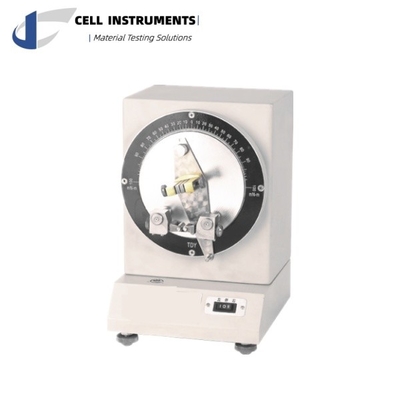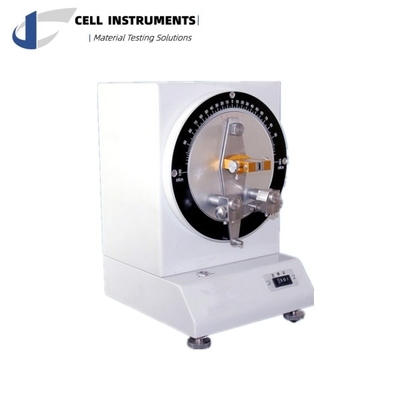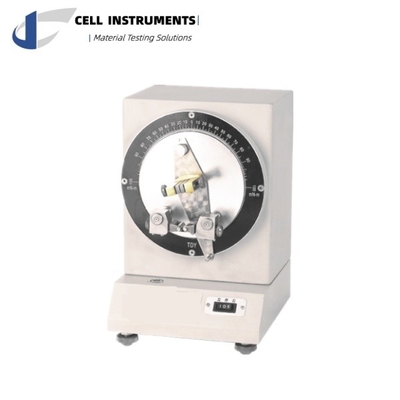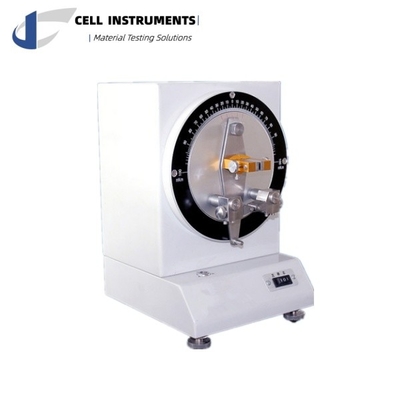Bending Stiffness Tester ASTM D5650 Taber-Type Tester Of Of Low Bending Stiffness
| Test Range | 1~500 MN.m (in 7 Ranges) | Bending Length | 50mm±0.1mm |
|---|---|---|---|
| Testing Speed | (200°±20°)/min | Bending Angle | 15°±0.3° And 7.5°±0.3° |
| 15°±0.3° And 7.5°±0.3° | 38*70 Mm |
Bending Stiffness Tester ASTM D5650 Taber-Type Tester Of Of Low Bending Stiffness
![]()
Introduction
The Bending Stiffness Tester ASTM D5650, specifically the WTD-02 Taber-Type Tester, is an essential instrument designed to measure the bending resistance of paper and paperboard. This testing device is crucial for industries where material properties must meet stringent standards, including packaging, food, beverage, and pharmaceuticals.
Utilizing the Bending Stiffness Tester ASTM D5650, users can assess the structural integrity of paper materials by determining how much bending moment is required to deflect a vertically clamped specimen. The test procedure adheres to ASTM D5650 standards, ensuring reliable and accurate results that meet industry requirements.
Test Methodology
The Bending Stiffness Tester ASTM D5650 operates primarily on high grammage papers. In the test, the bending moment needed to deflect the free end of a 38 mm wide specimen by 15° is measured. This is achieved while applying a load at a bending length of 50 mm. For materials that may become permanently deformed when bent through 15°, a reduced bending angle of 7.5° is also applicable.
The bending resistance is expressed as a bending moment in millinewton meters (mN·m), providing a quantitative measure of the material's flexibility and strength.
Key Terms
- Bending Resistance: This refers to the average bending moment required to flex a rectangular test piece secured at one end in a clamp. It is expressed in millinewton meters (mN·m).
- Bending Length: The fixed radial distance between the clamp and the point on the test piece where force is applied.
- Bending Angle: The angle through which the clamp rotates while transitioning from its starting position to the point of measurement. This can be 15° or 7.5°.
- Bending Resistance Index: This is calculated by dividing the bending resistance by the grammage raised to the third power.
Test Principle
To determine bending stiffness, a test piece of defined dimensions is bent at a specified angle. The resulting bending moment is recorded on the instrument's scale, allowing users to gauge the material's performance characteristics accurately.
Specifications
| Test range | 1~500 mN.m (in 7 ranges) |
| Indication error | ±2% |
| Bending length | 50mm±0.1mm |
| Testing speed | (200°±20°)/min |
| bending angle | 15°±0.3° and 7.5°±0.3° |
| Sample size | 38*70 mm |
| Dimension | 220*230*350mm |
| Net weight | 15kg |
| Power | AC 220V 50Hz |
Standards Compliance
The Bending Stiffness Tester ASTM D5650 is designed to meet multiple industry standards, including:
- ASTM D5342
- ASTM D5650
- ASTM D3301
- BS ISO 2493.2
- ISO 2493.2
- JIS P8125.2
- TAPPI T489
- TAPPI T566
- GB/T 2679.3
- GB/T 22364
FAQs
-
What kind of paper sample does the Bending Stiffness Tester ASTM D5650 apply to? The Bending Stiffness Tester ASTM D5650 is primarily used for high grammage papers.
-
Why is the bending stiffness test important? It provides critical data on the flexibility and durability of paper products, ensuring they meet necessary performance specifications.
-
How does the Bending Stiffness Tester ASTM D5650 enhance quality control? By accurately measuring bending resistance, manufacturers can optimize their processes and ensure product reliability.
-
What industries benefit from using the Bending Stiffness Tester ASTM D5650? Key industries include packaging, food, beverage, and pharmaceuticals, where material integrity is vital.
-
Can the Bending Stiffness Tester be customized for specific materials? Yes, the tester can be adapted to suit various material types, ensuring versatile applications across different sectors.
![]()






